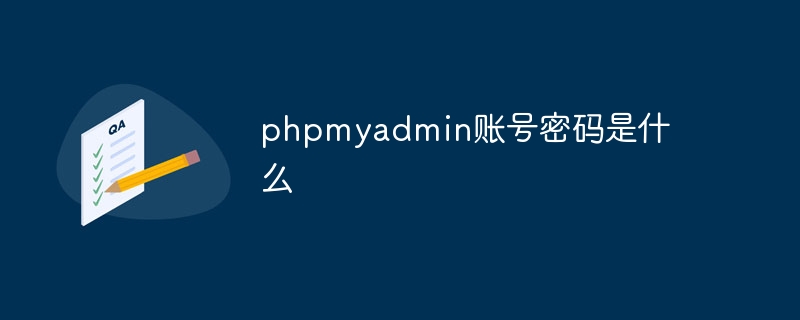 Backend Development
Backend Development PHP Tutorial
PHP Tutorial The whole process of phpMyAdmin installation and configuration method, and problem solving_PHP tutorial
The whole process of phpMyAdmin installation and configuration method, and problem solving_PHP tutorial
Text:
Today, I debugged the PHP database Mysql and installed the phpMyAdmin database management software on the work computer. It was originally a very simple matter, but several problems arose:
1/Unable to load mcrypt extension, please check PHP configuration;
2/The configuration file now requires a top-secret phrase password (blowfish_secret);
3/#2003-The server is not responding.
In order to prepare for emergencies, we have summarized the solutions to these problems encountered on the Piaoyi blog, so as to avoid having to read documents and find solutions when encountering such problems in the future.
Since the latest version of phpMyAdmin has been updated to 2.11.5.1, many configuration methods circulated on the Internet are from the old version and are no longer suitable for the configuration requirements of the new version; so flymorn also includes the configuration steps for phpMyAdmin2.11.5.1. Listed below; in order to facilitate switching and debugging PHP, I use the windows system and debug locally.
1. First download the phpMyAdmin installation package:
Go to the official foreign website, click the "DOWNLOADS" link on the navigation bar to enter the download page, select the "all-languages.zip" version to download locally, and decompress it; put the decompressed file into the phpmyadmin file in the virtual root directory specified by the system folder (the folder name can be customized), for example, the local storage location of flymorn is D:wwwphpmyadmin.
2. Find the /libraries/config.default.php file in the phpmyadmin folder (the old version is the config.inc.php file in the root directory), and open it for editing with WordPad that supports UTF-8 encoding.
3. Search $cfg['PmaAbsoluteUri']
Change it to the URL of phpMyAdmin that you will upload to the space
For example: $cfg['PmaAbsoluteUri'] = 'http://www.piaoyi.org/phpmyadmin/';
Because I am debugging locally, I changed it to $cfg['PmaAbsoluteUri'] = 'http://localhost/phpmyadmin/';
Note: Don’t miss the last backslash / and the beginning http.
4. Search $cfg['Servers'][$i]['host'] = 'localhost'; (usually the default is used, there are exceptions, and no modification is required)
5. Search $cfg['Servers'][$i]['auth_type'] = 'config';
Use config for debugging on your own machine; if you use cookies in the network space, since we have added the URL before, we will change it to cookies.
My personal suggestion: Whether it is local or online, it is recommended to set cookies, safety first.
At the same time, when the auth_type value is set to cookie, there is still one place that needs to be modified accordingly:
$cfg['blowfish_secret'] = '';
Change to: $cfg['blowfish_secret'] = 'www.piaoyi.org';
The www.piaoyi.org here can be defined by yourself, no more than 46 characters. If this field is left blank, the second error mentioned above will appear: "The configuration file now requires a top-secret phrase password (blowfish_secret)".
6. Find $cfg['Servers'][$i]['user'] = 'root'; // MySQL user (user name, use root on your machine; on the Internet, it is usually your ftp user name, virtual host The provider will tell you; generally do not modify it)
7. Search $cfg['Servers'][$i]['password'] = '123456'; // MySQL password (change 123456 to the user password to connect to your MYSQL database)
8. Find $cfg['DefaultLang'] = 'zh'; (here is the language selection, zh represents Simplified Chinese) and $cfg['DefaultCharset'] = 'gb2312'; (modify the default encoding to the national standard)
At this point, phpMyAdmin has been configured OK; you can open http://localhost/phpmyadmin/ to access the convenient and fast graphical management software phpMyAdmin. Regarding other options in the configuration file not mentioned in this article, you don’t need to worry about it or modify it. The specific how to operate phpMyAdmin is beyond the scope of this article, but the graphical interface is easy to understand and you will be able to use it after just a few glances (reference).
Let’s talk about several problems encountered by flymorn during the installation and configuration of phpMyAdmin.
The first question: "Unable to load mcrypt extension, please check PHP configuration".
1. The Mysql database is not installed correctly, and the Mysql-related services in the system services are not started.
2. The libmcrypt.dll file is missing in the system's system32 (C:windowssystem32) directory. The solution is to find libmcrypt.dll in the php directory, copy libmcrypt.dll to the C:windowssystem32 directory, and then restart the Web service.
3. In the php.ini file in the PHP directory, the first ";" in ";extension=php_mcrypt.dll" has not been removed, so the corresponding function cannot be used. The solution is to open the php.ini file and find;extension =php_mcrypt.dll changed to extension=php_mcrypt.dll //Remove the previous; to make it effective
4. The Mysql directory does not have read permissions. The correct directory permissions are as follows:
administrator Full control
system Full control
user Read and run
Delete all other user permissions (can also be retained, but the security is not high, it is recommended to delete), and then restart the MYsql service and Web service (it is recommended to restart the server after modifying this).
5. If none of the above methods work, use this method: Desktop>My Computer>Right-click Properties>Advanced>Environment Variables>System Variables>New
Name: phpdir
Value: C:php (whatever directory your PHP is in)
(Reference source: address)
Second question: "Unable to load mysql extension, please check PHP configuration"
Copy libmySQL.dll in the PHP directory to: c:windowssystem32, and then restart APACHE.
Third question: “Configuration files now require a top-secret phrase password (blowfish_secret)”
Make sure you have the correct settings in the config.default.php file:
$cfg['Servers'][$i]['auth_type']= 'cookie';
At the same time
$cfg['blowfish_secret'] = 'www.piaoyi.org'; //(Write this value as you like, but cannot leave it blank)
In fact, I was really depressed when I encountered this problem. If I followed the configuration method I mentioned above, this error should not be prompted. After more than 2 hours of constant modification of the config.default.php configuration file, I kept getting this error, which was almost on the verge of collapse.
Then I suddenly had an idea: I changed the auth_type authentication method to http, and when I changed it to config, this error always appeared when I opened the page. In other words, changing the authentication mode did not affect phpmyadmin. Could it be other configurations? Documentation affects decision making in phpmyadmin?
Immediately went to the phpmyadmin root directory, and surprisingly found that while there was a config.sample.inc.php file in the root directory, there was also a file config.inc.php! ! And this is the configuration file of the previous old version. It turns out that this file is the trouble. Delete config.inc.php immediately, enter the debugging page again, and the error disappears! Problem solved.
It seems that the config.inc.php configuration file in the root directory of phpmyadmin has a higher priority than the configuration file in /libraries/config.default.php. The system calls the configuration file in the root directory first, and then the configuration file in the libraries folder. Configuration file, Ai, I have been struggling with this problem for so long, so sad. It's finally solved, let me breathe a sigh of relief.
The fourth question: "#2003-The server did not respond."
If you encounter this problem, it is most likely that the MYSQL database has not been started. It is recommended to start MYSQL directly in: Control Panel-Administrative Tools-Services. Regarding whether to start, you can check whether there is a process such as "mysqld-nt.exe" in the task manager. If there is, it means that mysql has been started.
The fifth question: "The PHP extension setting mbstring was not found."
Modify the PHP.INI file under C:WINDOWS, find ;extension=php_mbstring.dll, remove;, save PHP.INI, and restart Apache.
It’s okay not to encounter these problems. But for novices, when they encounter it for the first time, they usually look everywhere for solutions. When a lot of methods on the Internet are not applicable, they will feel so helpless. I still suggest that you don’t worry when you encounter problems, read the documentation carefully, and refer to the solutions of your predecessors. Although they may not be applicable, they will be inspiring to you. Practice more and experiment more, no problem can stump you.
Author: pureboy
 phpmyadmin怎么设置主键Apr 07, 2024 pm 02:54 PM
phpmyadmin怎么设置主键Apr 07, 2024 pm 02:54 PM表的主键是一列或多列,用于唯一标识表中每条记录。设置主键的步骤如下:登录 phpMyAdmin。选择数据库和表。勾选要作为主键的列。点击 "保存更改"。主键具有数据完整性、查找速度和关系建模方面的好处。
 phpmyadmin怎么添加外键Apr 07, 2024 pm 02:36 PM
phpmyadmin怎么添加外键Apr 07, 2024 pm 02:36 PM在 phpMyAdmin 中添加外键可以通过以下步骤实现:选择包含外键的父表。编辑父表结构,在“列”中添加新列。启用外键约束,选择引用表和键。设置更新/删除操作。保存更改。
 phpmyadmin日志在哪里Apr 07, 2024 pm 12:57 PM
phpmyadmin日志在哪里Apr 07, 2024 pm 12:57 PMPHPMyAdmin日志文件的默认位置:Linux/Unix/macOS:/var/log/phpmyadminWindows:C:\xampp\phpMyAdmin\logs\日志文件用途:故障排除审计安全性
 phpmyadmin账号密码是什么Apr 07, 2024 pm 01:09 PM
phpmyadmin账号密码是什么Apr 07, 2024 pm 01:09 PMPHPMyAdmin 的默认用户名和密码为 root 和空。为了安全起见,建议更改默认密码。更改密码的方法:1. 登录 PHPMyAdmin;2. 选择 "privileges";3. 输入新密码并保存。忘记密码时,可通过停止 MySQL 服务并编辑配置文件的方式重置密码:1. 添加 skip-grant-tables 行;2. 登录 MySQL 命令行并重置 root 密码;3. 刷新权限表;4. 删除 skip-grant-tables 行,重启 MySQL 服务。
 phpmyadmin怎么删除数据表Apr 07, 2024 pm 03:00 PM
phpmyadmin怎么删除数据表Apr 07, 2024 pm 03:00 PMphpMyAdmin 中删除数据表的步骤:选择数据库和数据表;点击“操作”选项卡;选择“删除”选项;确认并执行删除操作。
 为什么phpmyadmin拒绝访问Apr 07, 2024 pm 01:03 PM
为什么phpmyadmin拒绝访问Apr 07, 2024 pm 01:03 PMphpMyAdmin 拒绝访问的原因及解决方案:认证失败:检查用户名和密码是否正确。服务器配置错误:调整防火墙设置,检查数据库端口是否正确。权限问题:授予用户对数据库的访问权限。会话超时:刷新浏览器页面重新连接。phpMyAdmin 配置错误:检查配置文件和文件权限,确保启用了必需的 Apache 模块。服务器问题:等待一段时间后再重试或联系主机提供商。
 phpmyadmin漏洞属于什么漏洞Apr 07, 2024 pm 01:36 PM
phpmyadmin漏洞属于什么漏洞Apr 07, 2024 pm 01:36 PMphpMyAdmin 易受多种漏洞影响,包括:1. SQL 注入漏洞;2. 跨站点脚本 (XSS) 漏洞;3. 远程代码执行 (RCE) 漏洞;4. 本地文件包含 (LFI) 漏洞;5. 信息泄露漏洞;6. 权限提升漏洞。
 phpmyadmin关联视图在哪Apr 07, 2024 pm 01:00 PM
phpmyadmin关联视图在哪Apr 07, 2024 pm 01:00 PM可以在 phpMyAdmin 中“结构”选项卡下的“视图”子菜单中找到关联视图。要访问它们,只需选择数据库、点击“结构”选项卡、然后点击“视图”子菜单。


Hot AI Tools

Undresser.AI Undress
AI-powered app for creating realistic nude photos

AI Clothes Remover
Online AI tool for removing clothes from photos.

Undress AI Tool
Undress images for free

Clothoff.io
AI clothes remover

AI Hentai Generator
Generate AI Hentai for free.

Hot Article

Hot Tools

SAP NetWeaver Server Adapter for Eclipse
Integrate Eclipse with SAP NetWeaver application server.

SublimeText3 Linux new version
SublimeText3 Linux latest version

MinGW - Minimalist GNU for Windows
This project is in the process of being migrated to osdn.net/projects/mingw, you can continue to follow us there. MinGW: A native Windows port of the GNU Compiler Collection (GCC), freely distributable import libraries and header files for building native Windows applications; includes extensions to the MSVC runtime to support C99 functionality. All MinGW software can run on 64-bit Windows platforms.

WebStorm Mac version
Useful JavaScript development tools

VSCode Windows 64-bit Download
A free and powerful IDE editor launched by Microsoft





